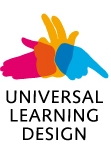Topical sections
- Standards of Universal Learning Design at Universities and Testing of Persons with Special Needs
- Linguistic Competence of the Hearing Impaired and the Role of Sign Languages and the Text Reporting in Tertiary Education
- Universal Design of Electronic Documents and Public Electronic Libraries for Purposes of Tertiary Education
- Compensation Tools for the Specific Learning Disorders and Other Types of Diversity in Tertiary Education
1 Standards of Universal Learning Design at Universities and Testing of Persons with Special Needs
The section focuses on:
- Legislative, methodological and technological standards of universal design and individual accommodation for persons with visual, hearing or mobility impairment, neurodiversity and chronic diseases.
- Universal design of Learning Potential Tests and Qualification Tests, standards for individual accommodations of partial sub-tests, and measurably of results.
- Universal design in national and international contexts: cooperation of schools during transition between various levels of education; school networks providing students’ mobility.
2 Linguistic Competence of the Hearing Impaired and the Role of Sign Languages and the Text Reporting in Tertiary Education
The section focuses on:
- Spoken language visualisation, speech-to-text reporting, and other systems of communication for persons with hearing impairment usable in tertiary education.
- E-learning systems, videoconferencing and instant messaging in sign languages.
- Sign language as a tool in tertiary education and specialized communication, its stylistic diversity and standards.
- Common European Framework of Reference for Languages in sign languages and testing of linguistic competences in these languages.
- Lexicology and lexicography of sign languages, development of vocabulary, issues with terminology and internationalisms.
- Sign languages recording and noting systems, creation of databases and linguistic corpora, software tools for handling databases and corpora.
- Linguistic, organizational, didactic and legal issues of translation and interpreting in academic settings.
3 Universal Design of Electronic Documents and Public Electronic Libraries for Purposes of Tertiary Education
The section focuses on:
- WCAG and comparable documents, their enforceability, advantages and imperfections in relation to persons with various types of special needs; web accessibility and usability; transferability of WCAG etc. to E-learning environments and specialized documents.
- Digital documents intended for reproduction of tactile, audio or visual documents, hybrid documents and DAISY.
- Universal design of video and audio formats.
- HTML, XML, MathML standards and digital tools for handling mathematical, physical, chemical and other symbolic notations via tactile or audio outputs.
- Digital libraries and their accessibility, digitization and standards for conversions among formats; public library catalogues and their accessibility, sharing and internationalization.
- Cataloguing of digital documents as well as tactile, audio and graphical documents.
- Copyright issues related to universal design and individual accommodation of documents and individual access at national and international levels.
4 Compensation Tools for the Specific Learning Disorders and Other Types of Diversity in Tertiary Education
The section focuses on:
- Compensation strategies, their practicing and approach to persons with a compensatory disability.
- Individual accommodation of testing environment and technological compensatory devices.
- Differences in work with a screen reader, voice output and electronic formats between persons with specific learning disorders and the visually impaired.
- Electronic libraries and their usability by persons with specific learning disorders, digitization and standards for conversion among formats.
- Copyright issues related to universal design of documents for persons with specific learning disorders.









